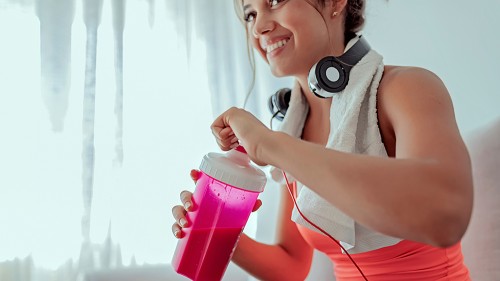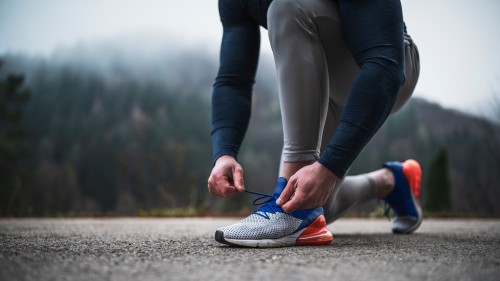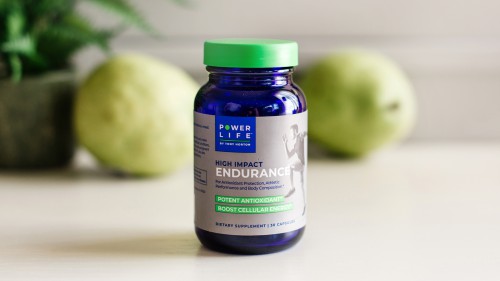Legion Pulse Pre-Workout Review: A Solid Choice to Boost Workout Performance
Published on May 13, 2022
Medically Reviewed by Natalie Olsen, MS, RDN
Legion Pulse pre-workout is a supplement packed full of ingredients such as caffeine, citrulline, and beta-alanine, among others, to boost energy and strength and reduce fatigue in the gym.


|
Pros
|
Cons
|
What Is Legion Pulse Pre-Workout?
Pulse is a pre-workout supplement designed to be taken 15–30 minutes before your workout.
It contains a variety of ingredients in effective doses for enhancing exercise performance, power, and strength.
These ingredients include:
- Citrulline Malate: An amino acid bound with an organic acid — malic acid — that improves muscle function and decreases fatigue. (1)
- Beta-Alanine: An amino acid that increases exercise capacity and decreases muscle fatigue. (2)
- Betaine: A molecule that regulates water balance in cells and may help increase muscle strength and power. (3)
- Caffeine: A nervous system stimulant that helps you exercise harder and longer. (4)
- Theanine: An amino acid that may improve focus and alertness, especially when combined with caffeine. It also can aid in recovery after a workout. (5, 6)
- Alpha-Glycerophosphocholine (Alpha-GPC): A choline-containing compound that replenishes choline levels to enhance power output. (7)
Unlike many other popular pre-workout supplements, Pulse doesn’t contain creatine.
Pulse contains 10 or 21 servings per container, and you can choose from more than a dozen flavors.
Pulse uses no artificial sweeteners, flavors, or colors.
If you’re sensitive to caffeine’s effects or you work out at night, you can purchase Pulse without caffeine.
Each two-scoop serving provides about 24 grams of powder, which easily mixes with 10–12 fluid ounces of cold water.
You can mix the powder with water using a shaker cup or in a glass using a stirring utensil, like a spoon.
The product is third-party tested to ensure that it contains what the label states without impurities.
Pulse was created by Mike Matthews, a bestselling fitness author and founder of Legion Athletics, a proclaimed natural, science-based sports supplement line.
Summary
Pulse is a supplement designed to be taken within 15–30 minutes of your workout. It contains effective doses of a variety of ingredients that have been shown to enhance workout performance.
Is It Effective?
Pulse claims to enhance energy and focus, increase strength and endurance, and reduce fatigue.
While no study has directly examined these claimed benefits, Pulse Pre-Workout contains effective doses of ingredients that have evidence to support them.
Increases Strength and Endurance
Pulse contains caffeine, beta-alanine, and betaine, three ingredients that have been shown to increase strength and endurance.
Caffeine is a nervous system stimulant that reduces how hard you feel like your body is working, which can translate to increases in strength and power.
One review of 294 studies involving 149 people found that supplementing with 0.41 to 3.2 mg of caffeine per pound (0.9 to 7 mg per kilogram) of body weight significantly increased upper body muscle strength and power. (8)
This caffeine dose translates to 62–480 mg of caffeine for a 150-pound (68.2-kg) person, with Pulse providing 350 mg of caffeine per serving.
It is important to note that the U.S. Food and Drug Administration (FDA) recommends no more than 400 mg of caffeine per day. However, if you are sensitive to caffeine, a much smaller dose or none at all may be best. (9)
The second ingredient that can enhance strength and endurance is beta-alanine.
Beta-alanine works by increasing muscle carnosine concentrations, which helps buffer the acids that form within muscle cells during intense exercise that contribute to fatigue.
Thus, supplementing with beta-alanine allows you to exercise harder and longer before fatigue hits.
Pulse provides an effective 3.2 grams of beta-alanine per serving.
A review of 40 studies involving 1,461 participants found that supplementing with beta-alanine in the range of 3.2–6.4 grams daily for at least four weeks led to significant improvements in a variety of exercise tests that rely on strength and endurance. (10)
Finally, Pulse contains 2.5 grams of betaine, also known as trimethylglycine, per serving.
Although the research to support betaine for increasing muscle strength and endurance isn’t as strong as caffeine or beta-alanine, it has been shown to increase muscle strength and power by up to nearly 25% when supplemented with 2.5 grams daily for seven days. (3)
Enhances Energy and Focus
Increased energy and focus are popular reasons why people use pre-workout supplements.
Due to its stimulating effects, caffeine is the most beneficial ingredient for enhancing energy in Pulse, but theanine can also offer energy and focus benefits.
Theanine is an amino acid that works synergistically with caffeine to enhance focus and attention. (11)
Theanine also helps mellow out caffeine’s stimulating effects, allowing for more sustained attention and arousal and potentially fewer side effects associated with caffeine, like jitters or anxiety. (11)
What’s more, theanine may offer exercise recovery benefits by reducing post-exercise inflammatory markers. (12)
Pulse provides 350 mg of theanine per serving, which is more than studies have used to assess its energy and focus benefits.
Reduces Fatigue
By delaying or reducing fatigue, you can train harder and longer. Pulse provides two ingredients that can help reduce fatigue — citrulline and alpha-GPC.
Pulse provides 8 grams of citrulline malate per serving.
Citrulline is an amino acid that increases your body’s production of nitric oxide, a molecule that widens blood vessels to allow more oxygen and nutrient delivery to your muscles. (1)
This increase in oxygen and nutrients can reduce fatigue, allowing you to perform more repetitions for a given weight than you otherwise could.
One review of eight studies found that participants were able to complete an average of three more repetitions during strength training before fatiguing after supplementing with 6–8 grams of citrulline malate before their workouts compared with a placebo. (1)
The other ingredient that may increase energy and focus is alpha-GPC, a compound that increases brain choline levels.
Strenuous exercise tends to deplete choline levels, which may contribute to fatigue and limit exercise performance. (7)
As such, supplementing with alpha-GPC has been suggested to delay fatigue and increase muscle power.
One study demonstrated that 48 men who supplemented with 250–500 mg of alpha-GPC for seven days significantly increased muscle power on a test that measures maximal strength. (7)
However, no improvements were found for other performance measures of strength.
This study suggested that 250 mg of alpha-GPC is the minimum dose needed to experience these benefits, but that greater benefits have been observed with 600 mg.
For reference, Pulse provides 300 mg of alpha-GPC per serving.
Caffeine also helps reduce fatigue by blocking adenosine receptors in your brain to which adenosine binds and slows down the activity of neurons, ultimately causing you to feel sleepy. (13)
Support for Claimed Benefits
Legion Pulse Pre-Workout contains a variety of ingredients in effective doses to increase strength and endurance, enhance energy and focus, and delay fatigue.
| Increases strength and endurance | 4/5 |
| Enhances energy and focus | 4/5 |
| Delays fatigue | 4/5 |
Side Effects and Safety
Just as there are no studies assessing the effectiveness of Pulse directly, there are no studies to date assessing the product’s safety.
However, because the ingredients in Pulse have a strong safety profile, it’s likely safe for most people. (14)
Still, some users, especially females, may experience skin reactions, an elevated heart rate, and nausea. (15)
Beta-alanine may cause paresthesia, which refers to a tingling or prickling sensation that is usually felt in the hands, arms, and face. (16)
Paresthesia is harmless and goes away on its own, but it can be an annoyance to some.
Caffeine is the other ingredient that can cause side effects, especially a rapid heart rate, anxiety, restlessness, stomach upset, and difficulties sleeping, even when supplemented alongside theanine. (17)
Pulse provides 350 mg of caffeine serving, which is equivalent to about 3.5 eight-ounce cups (840 mL) of coffee.
This caffeine amount can be enough to produce these side effects, especially in people who are sensitive to caffeine or who are not habitual consumers of it. (18)
Studies suggest that a safe daily caffeine limit is around 400 mg per day for healthy adults and less than 200 mg per day for women who are pregnant or breastfeeding. (19)
As such, you should limit your caffeine from other sources like soda, coffee, tea, or energy drinks with Pulse.
Alternatively, you can purchase caffeine-free Pulse.
In either case, it’s recommended to start with one scoop or half of a serving first to assess your tolerance.
Pulse is third-party tested to ensure it contains the ingredients in the amount claimed on the label without impurities.
Summary
Pulse Pre-Workout is likely safe for most people. However, it contains beta-alanine, which can cause a harmless sensation called paresthesia. Pulse also contains a good amount of caffeine, so if you’re sensitive to caffeine’s effects, it may be best to opt for the caffeine-free version or start with half of a serving.
Cost and Where to Buy
Pulse Pre-Workout is primarily available online at legionathletics.com.
There you can purchase a 10-serving tub for $24.99 ($2.49 per serving) or a 21-serving tub for $31.99–$39.00 ($1.52–$1.90 per serving), depending on the flavor.
Caffeine-free Pulse is only available in the 21-serving size and costs the same as the regular Pulse.
You can save 10% off the price by subscribing to automatically receive a Pulse every 30, 60, or 90 days.
Legion also allows you to save if you bundle Pulse with some of their other supplements.
Legion offers free shipping and a 100% money-back guarantee if you decide Pulse isn’t right for you.
You can also find Pulse on Amazon.com for around the same price as the Legion Athletics website.
Summary
You can purchase Pulse Pre-Workout on the manufacturer’s website or Amazon.com. Pulse contains 10 or 21 servings per tub and costs $25–$39 ($1.52–$2.49 per serving), depending on the size and flavor.
How Pulse Compares with Alternatives
Pre-workout supplements are one of the most popular supplement categories on the market.
Many pre-workout supplements share similar ingredients, but they may differ in the other ingredients that they contain or in their amounts.
Here’s a look at how Pulse stacks up to other popular pre-workout products:
| Product | Key Ingredients | Servings | Price (per serving) |
|---|---|---|---|
| Legion Pulse Pre-Workout |
Beta-Alanine: 3.6 g Citrulline Malate: 8 g Betaine: 2.5 g Alpha GPC: 300 mg Theanine: 350 mg Caffeine: 350 mg |
21 |
$35 ($1.66 per serving) |
| Pre JYM |
Creatine HCL: 2 g Citrulline Malate: 6 g Beta-Alanine: 2 g Betaine: 1.5 g Alpha-GPC: 150 mg Caffeine: 300 mg |
30 |
$49 ($1.63 per serving) |
| Optimum Nutrition Pre-Workout |
Creatine Monohydrate: 3 g Beta-Alanine: 1.5 g L-Citrulline: 750 mg Caffeine: 175 mg |
30 |
$35 ($1.17 per serving) |
| C4 Original |
Creatine Nitrate: 1 gram Beta-Alanine: 1.6 g Arginine Alpha Ketoglutarate: 1 g Caffeine: 150 mg |
30 |
$30 ($1.00 per serving) |
| Prolific |
Citrulline: 6 g Betaine: 2.5 g Rhodiola Rosea: 100 mg L-Tyrosine: 500 mg Coffee Fruit Extract: 100 mg Caffeine: 320 mg |
20 |
$35 ($1.75 per serving) |
Prices were pulled from Amazon for consistency.
Summary
Compared with other popular pre-workout products, Pulse is on the upper end of price but provides effective ingredients in their studies doses.
Frequently Asked Questions
What does Pulse do?
Pulse provides a variety of ingredients that — when taken 15–30 minutes before your workout — enhance energy, increase strength and endurance, and reduce fatigue.
Does Pulse have caffeine?
Pulse provides 350 mg of caffeine per serving — equivalent to about 3.5 eight-ounce (840 mL) cups of coffee.
Does Pulse contain creatine?
Pulse Pre-Workout contains no creatine.
Is Pulse vegan?
Pulse contains honey as part of its natural flavoring and is therefore not considered vegan.
The Bottom Line
Pulse is a popular pre-workout product that contains ingredients in their studied doses to increase strength and endurance, enhance energy and focus, and reduce fatigue.
The ingredients in Pulse have a strong safety profile and are likely safe for most people.
However, taking Pulse may cause a harmless, temporary tingling sensation that primarily affects the hands, arms, and face.
Pulse also contains a high dose of caffeine, so if you are sensitive to caffeine’s effects, start with one scoop or half of a serving, or opt for the caffeine-free Pulse.
You can purchase Pulse on the manufacturer’s website or on Amazon, where the price ranges from $25–$39 ($1.52–$2.49 per serving), depending on the size and flavor.
While on the upper end of price, Pulse offers a great value compared with other popular pre-workout products.
At WellnessVerge, we only use reputable sources, including peer-reviewed medical journals and well-respected academic institutions.
- Acute Effect of Citrulline Malate on Repetition Performance During Strength Training: A Systematic Review and Meta-Analysis - PubMed:
https://pubmed.ncbi.nlm.nih.gov/34010809/ - International society of sports nutrition position stand: Beta-Alanine - PMC:
https://www.ncbi.nlm.nih.gov/pmc/articles/PMC4501114/ - Effects of Betaine Supplementation on Muscle Strength and Power: A Systematic Review - PubMed:
https://pubmed.ncbi.nlm.nih.gov/28426517/ - International society of sports nutrition position stand: caffeine and exercise performance - PMC:
https://www.ncbi.nlm.nih.gov/pmc/articles/PMC7777221/ - l-Theanine and caffeine improve target-specific attention to visual stimuli by decreasing mind wandering: a human functional magnetic resonance imaging study - PubMed:
https://pubmed.ncbi.nlm.nih.gov/29420994/ - Effects of acute caffeine, theanine and tyrosine supplementation on mental and physical performance in athletes | Journal of the International Society of Sports Nutrition | Full Text:
https://jissn.biomedcentral.com/articles/10.1186/s12970-019-0326-3 - Evaluation of the effects of two doses of alpha glycerylphosphorylcholine on physical and psychomotor performance - PMC:
https://www.ncbi.nlm.nih.gov/pmc/articles/PMC5629791/ - Effects of caffeine intake on muscle strength and power: a systematic review and meta-analysis - PMC:
https://www.ncbi.nlm.nih.gov/pmc/articles/PMC5839013/ - Caffeine | The Nutrition Source | Harvard T.H. Chan School of Public Health:
https://www.hsph.harvard.edu/nutritionsource/caffeine/ - β-alanine supplementation to improve exercise capacity and performance: a systematic review and meta-analysis | British Journal of Sports Medicine:
https://bjsm.bmj.com/content/51/8/658 - The effects of TeaCrine® and caffeine on endurance and cognitive performance during a simulated match in high-level soccer players - PubMed:
https://pubmed.ncbi.nlm.nih.gov/30999897/ - The effect of L-theanine supplementation on the immune system of athletes exposed to strenuous physical exercise - PubMed:
https://pubmed.ncbi.nlm.nih.gov/30770758/ - Adenosine, caffeine, and performance: from cognitive neuroscience of sleep to sleep pharmacogenetics - PubMed:
https://pubmed.ncbi.nlm.nih.gov/24549722/ - Multi-ingredient pre-workout supplements, safety implications, and performance outcomes: a brief review - PubMed:
https://pubmed.ncbi.nlm.nih.gov/30089501/ - Common Habits, Adverse Events, and Opinions Regarding Pre-Workout Supplement Use Among Regular Consumers - PMC:
https://www.ncbi.nlm.nih.gov/pmc/articles/PMC6520716/ - A Systematic Risk Assessment and Meta-Analysis on the Use of Oral β-Alanine Supplementation - PMC:
https://www.ncbi.nlm.nih.gov/pmc/articles/PMC6520041/ - Caffeine - StatPearls - NCBI Bookshelf:
https://www.ncbi.nlm.nih.gov/books/NBK519490/ - Coffee, brewed - FoodData Central:
https://fdc.nal.usda.gov/fdc-app.html#/food-details/1104137/nutrients - The Safety of Ingested Caffeine: A Comprehensive Review - PMC:
https://www.ncbi.nlm.nih.gov/pmc/articles/PMC5445139/






